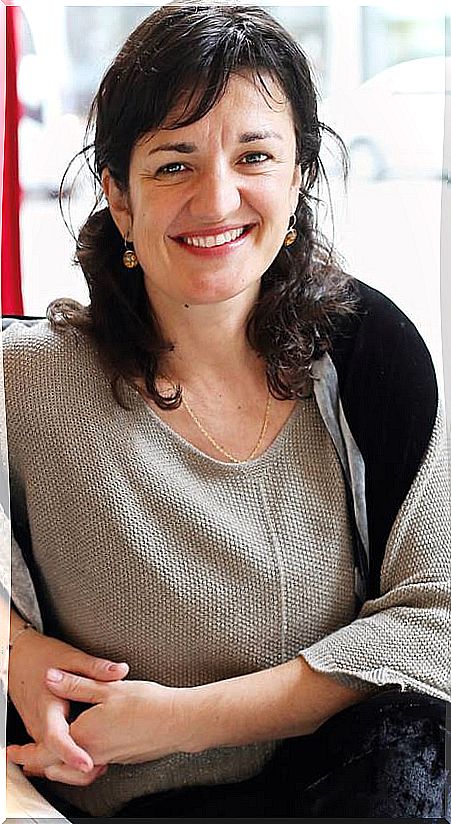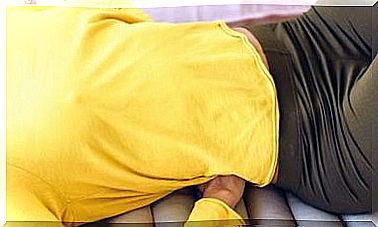“If We Doctors Leave Our Emotions Out, We End Up Mistreating”
“We suppose that by maintaining the therapeutic distance we are more objective, but this causes us great suffering, also for professionals. I work so that we learn to take care of us. ”

Ibone Olza is a psychiatrist specializing in perinatal mental health and an associate professor at the University of Alcalá, where she teaches psychology and clinical communication.
She is also a researcher in various projects on child and perinatal mental health. She is currently collaborating on a project funded by the European Union on childbirth.
What is this great research at European level on childbirth?
It is a beautiful project in which we are more than one hundred professionals from twenty-seven countries. We are investigating everything that is childbirth, trying to build another model from salutogenesis and from physiology. It is a multidisciplinary project that arises from British midwives, but in which there are also psychologists, engineers, architects, activists …
And what is your role?
Within this project funded by the European Union, I lead the group that investigates the neuropsychosocial aspects of childbirth. There’s the great oxytocin researcher, Kerstin Uvnäs-Moberg, a Swedish doctor who has been researching its effects all her life. We are investigating the psychology of physiological childbirth.
Tell us a bit about the process.
We are analyzing all the qualitative investigations of women who have had physiological, non-medicalized deliveries. It has been difficult to find these studies because there is little published. Our objective is to see if there is a universal physiological, psychophysiological process that we can expect in all women in labor, regardless of their culture, to later see the neurohormonal correlate. It is a beautiful project.
You assure that childbirth is a critical moment in life.
It’s amazing what a beautiful and powerful impact it can have. It is a moment of great vulnerability and even more so if we add abuse, which is frequent and enormous. Many women do not know what their delivery could have been. That is why we are investigating the European project.
And you also serve mothers. What are the most frequent inquiries?
Yes, I take care of pregnant women or new mothers. And women who already had a psychiatric treatment or need it at that time and find many difficulties because they cannot take the medication or because they cannot become pregnant. Some suffer from bipolar disorder, others had a traumatic delivery and have severe post-traumatic stress disorder and need treatment …
Do you run into many difficulties?
Most suffer all this in silence because they are not even detected. The family often does not find out that the mother was very ill, that is why they call postpartum depression smiling depression. Now we are working to avoid it, so that there is a mounted network of professionals, gynecologists, psychiatrists …
Activism in childbirth is still necessary. How did it come about in your case?
My first child was born when I was 25, the second was 27 and my daughter was 30. I had them very young. Being a mother coincided with situations of great stress because I was doing the specialty of psychiatry and it was very hard, with violent situations in the guards, far from my home … Vía Láctea, the Zaragoza breastfeeding support group, helped me a lot . These mothers taught me so much. But the activism started with my second son being admitted to hospital in an ICU. It took me a week to hold him and that was very traumatic for my son and me. I started as an activist and later as a psychiatrist, treating women who had gone through very traumatic births like me. So it was like a need to heal my births and also to be able to help the mothers.
And how did it continue?
Activism spread. In 2001 it started with the Foro de Apoyocesáreas forum. Moms who had traumatic vaginal deliveries arrived immediately, as well as many professionals who were very concerned about how they worked. That’s where El Parto es Nuestro came from, in 2003. The women of Apoyocesáreas, twenty women and one man, founded it.
With what objective was El Parto es Nuestro born?
We demand respect and that delivery care in Spain be based on evidence, because in Spain in those years many of us were treated in obsolete, harmful and damaging ways. The first years we did a lot of street activism, we went to the media, to the Ministry of Health … This was recognized in 2007: the Ministry of Health decided to launch the Strategy for Attention to Normal Delivery in Spain. It was a huge collective effort that has meant a significant improvement. There is still a lot to do, but in these years we have seen improvements.
And is it still going on?
El Parto es Nuestro continues to support mother to mother. We do not give any recommendation. One of our principles is that every woman knows what is best for her. We give information, we hold free open meetings throughout Spain. And we continue to grow, now we have El Parto es Nuestro Argentina, Ecuador … And many information campaigns underway.
Do you feel that with all this activism you managed to get there?
I think we have achieved things, such as that the humiliating, insulting treatment that there was no longer occurs because many professionals feel observed. You don’t hear things like before, like: “Don’t scream now if you weren’t screaming when you did.”
Now there is more respect …
Yes, but it is not enough. The systems always appropriate the discourse of the social movements and now they use a loving and caring voice, but they are also giving you an induction that is not based on any medical cause, only on their convenience. Of course, the mother will be told that something was wrong with the baby and that is how you are sold.
Have we improved so little?
There are many professionals working hard to make things improve, but there is still obstetric violence that is difficult to see because, if they have treated you with a smile, how are you going to make visible that it is a lie, that your baby was not in danger …
They keep using fear … First-time mothers don’t want to hear bad news.
I often have this dilemma, because you don’t want to scare a pregnant woman, but at the same time you see that they are going to a place where it is not respected … The system appropriates part of the discourse and says: “No, no, if we have now painted the delivery room yellow and we have put some flowers on it “. But that is pure makeup, if the professionals have not integrated what respect is, it is useless.
There is much to do.
A good part of my job is that they listen to the baby, that the professionals talk to them, talk to them, interact with them … There is a huge denial. Babies are gifted for interaction, they have an enormous capacity to perceive emotions. But for this to be assumed and integrated, it is difficult.
Where are your investigations focused?
My gaze always goes to the brain. I have realized that what they have told us about childbirth is a reductionist vision and I am trying to understand childbirth from the brain. Because childbirth is an exceptional moment at a neurobiological level, there is an unrepeatable chemical scenario in the mother and the baby. In childbirth there is an altered state of consciousness that entails extreme vulnerability and it is worrying that the professionals who attend the delivery do not know this.
And what can happen in a medicalized delivery?
Watching experiments with mammals, you put your hands to your head when you see what happens when giving synthetic oxytocin in childbirth. On the other hand, in hospitals for years it was not even noted in the medical history. It is given as if it were harmless, without knowing how it affects babies.
Have you already published any of your research?
I started this line of research on the effect of intrapartum oxytocin. And with this we published several works and we continue with the perinatal alterations. That is, what happens in the brain of a mother and the baby if you do a scheduled cesarean section without labor; what if, when labor is very advanced, you do a forceps or general anesthesia; what if in a premature delivery you give Atosiban, which we already know is a drug that blocks oxytocin receptors; what happens to the brain of that baby that is in that womb. I am also researching how to prevent this damage. And, on the other hand, how to minimize it, how to do psychic containment, how to enhance physiology …
And how then can we reduce this damage?
The first thing is to understand the physiology. For many mothers this is already liberating. Understand, for example, that if I have enormous difficulty connecting with my baby, it may still have to do with the fact that I have had a cesarean section scheduled for week 38 and I have been separated from my baby for 48 hours. And that means my brain hasn’t released a mountain of oxytocin.
Understanding allows healing.
When there has been damage, we have to recognize it and name it. And enhancing physiology goes through: being skin to skin, breastfeeding, accompaniment, community … It is fascinating that nature has arranged love, enjoyment, pleasure … But culture represses it, destroys it , inhibits it. We must recover the role of pleasure in health, as a self-regulator.
Is there receptivity in families?
I think so, but to work on all these issues you have to have a therapeutic relationship, continuity, some resources. But here, in recent years, there has been a very significant deterioration in mental health care. Psychiatrists or psychologists find themselves with a thirty-minute consultation in the best of cases and with some patients that they will see again hopefully after a month or even two.
Little can be done like this …
Sometimes the only thing the doctor will be able to do is prescribe a psychoactive drug. I left the public system frustrated because, although I and many others wanted to work in a different way, we were not allowed. You cannot see parents whose children have just been diagnosed with autism in half an hour and tell them to come back after a month …
How do you get to work in these circumstances?
I have seen the suffering of many midwives, gynecologists, pediatricians and also my own as a psychiatrist. Given this, we feel complicit in this violence, we feel that sometimes we are mistreating in an emergency, in childbirth … How can we end up mistreating? How can I order a patient to be tied to a bed? How do we get to these extremes …?
How?
Medicine, with this theory of therapeutic distance, teaches us, instills in us, that we have to hide our emotions, that we doctors are technicians and we leave emotions out because only in this way will we be objective. But that is a lie, and it is not only a lie, but it is very, very harmful. It generates enormous suffering. And if we professionals leave our emotions out, we end up mistreating and with a lot of violence, in addition.
And how does this path unravel?
Much of my work tries to get professionals to work with emotions. Intuition, for example, is a guide, but you have to take care of it. You can’t serve mountains of patients. You cannot be in psychiatric emergency guards where you see patients with serious psychotic disorders, where you can treat ten suicides in 24 hours. There is a level of suffering, of pain, enormous. Professionals themselves are also being mistreated by the system. Now I work on how to make us take care of ourselves.
It is impossible to work in those conditions and help someone like that …
What good is a hospital to us, if half of the professionals who work there are at risk of ending up ill or with an addiction to alcohol or toxins, or with a heart attack or early cancer? How can it be that a public health system does not take care of the health of its professionals?
It is harmful to patients and to doctors.
It is necessary to promote a greater awareness in health professionals because, not only do they fall ill, it is that the way they have to tolerate all this is to distance themselves and then they do not activate intuition or wisdom at the service of the other.
And how can a change occur?
There is only change if there is a process of personal assimilation. And it’s hard to see what happened to you. It is very hard for someone to come and tell you that you are practicing obstetric violence. To get there, you have to see what has happened to you, when you have not cared for a patient or have not accompanied him as you would have liked to be cared for.
Was it like that in your case?
Since I have left Public Health, I am realizing, more and more, how painful it was for me. And I was not aware of how much it affected me on a personal level. It is badly posed. In this society we do not want to see suffering, disability, mental illness, collective responsibility for care. We put a few in the care of all.
Something you would want to implement now if you could …
A first more political point: we have to go towards degrowth and we must understand how we treat mothers and how we treat the Earth. We are destroying the Earth and destroying our health and the health of our children. There the change has to be very deep.
And another more practical?
For me, the most urgent thing is to help mothers, to help mothers to raise. And there we also need a deep social change so that they are not alone. It doesn’t have to be an individual thing, it has to be collective. Take care of pregnant women so that they do not have the fear that they now have of losing their job, so that they are not forced to work, so that they know that they will be able to raise naturally, with pleasure and with all the flexibility in the world.
We have to understand that we are made for health, for pleasure, for enjoyment. It has to be totally turned around.








